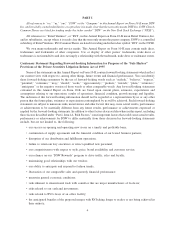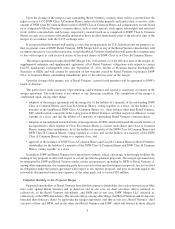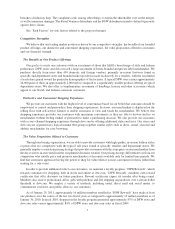DSW 2010 Annual Report Download - page 18
Download and view the complete annual report
Please find page 18 of the 2010 DSW annual report below. You can navigate through the pages in the report by either clicking on the pages listed below, or by using the keyword search tool below to find specific information within the annual report.and we may not be successful in attracting, assimilating and retaining the personnel required to grow and operate
our business profitably.
We may be unable to compete favorably in our highly competitive market.
The retail footwear market is highly competitive with few barriers to entry. We compete against a diverse group
of retailers, both small and large, including department stores, mall-based shoe stores, national chains, independent
shoe retailers, single-brand specialty retailers, online shoe retailers, multi-channel specialty retailers and brand-
oriented discounters. Some of our competitors are larger and have substantially greater resources than we do. Our
success depends on our ability to remain competitive with respect to style, price, brand availability and customer
service. The performance of our competitors, as well as a change in their pricing policies as a result of the current
economic environment, marketing activities and other business strategies, could have a material adverse effect on
our business, financial condition, results of operations and our market share.
We are dependent on our “DSW Rewards” program to drive traffic, sales and loyalty.
“DSW Rewards” is a customer loyalty program that we rely on to drive customer traffic, sales and loyalty.
“DSW Rewards” members earn reward certificates that offer discounts on future purchases. In fiscal 2010, shoppers
in the loyalty program generated approximately 87% of DSW store and dsw.com sales versus approximately 84% of
DSW store and dsw.com sales in fiscal 2009. As of January 29, 2011, approximately 16 million members enrolled in
“DSW Rewards” have made at least one purchase over the course of the last two fiscal years, compared to
approximately 13 million members as of January 30, 2010. In the event that our “DSW Rewards” members do not
continue to shop at DSW or the number of members decreases, it could have a material adverse effect on our sales
and results of operations.
Uncertain economic conditions in the United States and other world events have adversely affected
consumer confidence and consumer spending habits.
Consumer spending habits, including spending for the footwear and related accessories that we sell, are
affected by, among other things, prevailing economic conditions, levels of employment, salaries and wage rates,
prevailing interest rates, income tax rates and policies, consumer confidence and consumer perception of economic
conditions. In addition, consumer purchasing patterns may be influenced by consumers’ disposable income.
Consumer confidence is also affected by the domestic and international political situation. The outbreak or
escalation of war, natural disasters, or the occurrence of terrorist acts or other hostilities in or affecting the
United States, could lead to a decrease in spending by consumers. In an economic slowdown, we could experience
lower net sales than expected on a quarterly or annual basis and be forced to delay or slow our retail expansion plans.
Reduced sales may result in reduced operating cash flows if we are not able to appropriately manage inventory
levels or leverage expenses. These negative economic conditions may also affect future profitability and may cause
us to reduce the number of future store openings, impair long-lived assets or impair goodwill.
Uncertain economic conditions are also impacting credit card processors and financial institutions which hold
our credit card receivables. We depend on credit card processors to obtain payments for us. In the event a credit card
processor ceases operations or the financial institution holding our funds fails, there can be no assurance that we
would be able to access funds due to us on a timely basis, which could have a material adverse effect on our
business, financial condition, results of operations and cash flows.
We rely on foreign sources for our merchandise, and our business is therefore subject to risks associated
with international trade.
We purchase merchandise from domestic and foreign vendors. In addition, many of our domestic vendors
import a large portion of their merchandise from abroad, primarily from China, Brazil and Italy. We believe that
almost all the merchandise we purchased during fiscal 2010 was manufactured outside the United States. For this
reason, we face risks inherent in purchasing from foreign suppliers, such as: economic and political instability in
countries where these suppliers are located; international hostilities or acts of war or terrorism affecting the
United States or foreign countries from which our merchandise is sourced; increases in shipping costs;
14
























